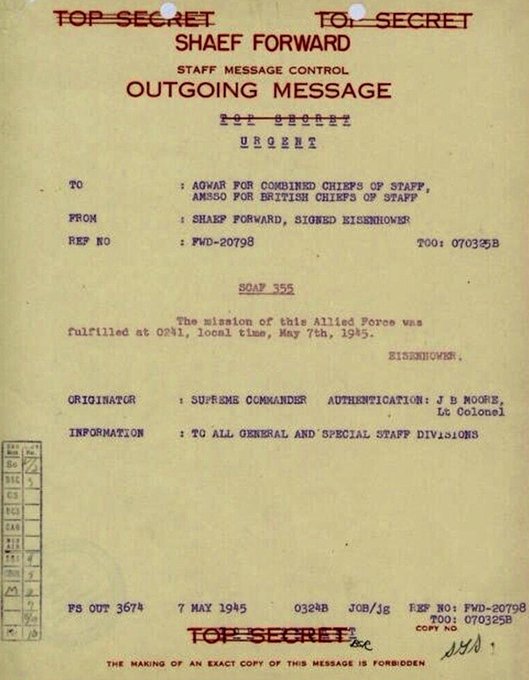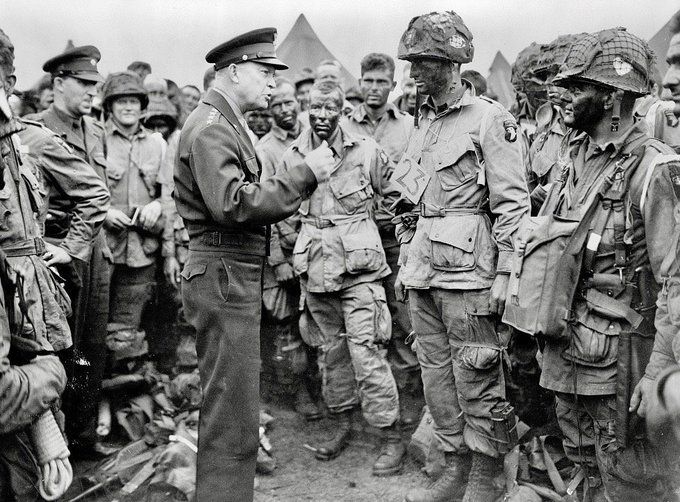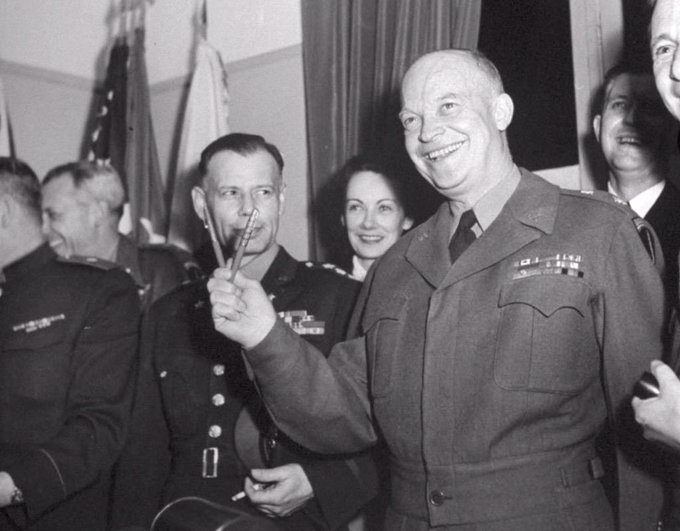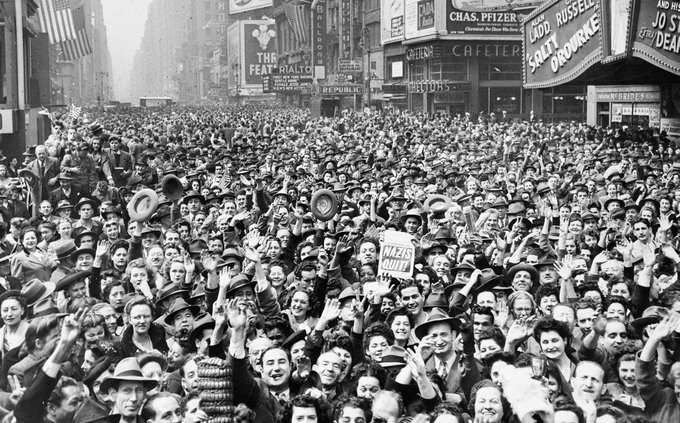Thursday marks the 75th anniversary of the surrender of Nazi German forces to the Western Allies after six long years of fighting in the world’s deadliest war.
Supreme Allied Commander Dwight D. Eisenhower, exhausted, issued a terse one-sentence announcement from his headquarters in Reims, France, where the surrender had taken place:
“The mission of this Allied force was fulfilled at 0241, local time, May 7, 1945.”
“I should have felt elation, but all I felt was tired, dead beat,” the general said at the culmination of World War II in Europe.
Ike first took command of troops in the field during the war in the Allied North African campaign called Torch in November 1942.
Promotions quickly followed, with President Franklin Roosevelt and Army Chief of Staff George C. Marshall liking what they saw in Eisenhower.
Ultimately, he was selected by FDR as Supreme Allied Commander, overseeing troops from the United States, Great Britain, Canada and France and tasked with liberating Western Europe from the tyranny of Nazi Germany.
It was in this role that Eisenhower crossed the threshold into legendary war hero status as he led Operation Overlord, the largest amphibious operation in the history of warfare, otherwise known as D-Day, on June 6, 1944.
The West Point graduate proved his mettle again in December 1944, when the German Army launched a massive offensive, which came to be known as the Battle of the Bulge, taking place at the Ardennes Forest in Belgium and France.
General Dwight Eisenhower gives pep talk to US paratroopers before they board planes for D-Day assault, 75 years ago this week:
1,359 people are talking about this
Despite his forces being initially thrown back, Ike rallied the Allies on to victory as they completely pushed the bulge in their lines back by January, and then it was on to the heartland of Germany itself.
By April 1945, the reign of Adolf Hitler’s Third Reich was nearing its end. The Allies came from both the east and west and occupied more and more of Germany. On the 25th of the month, the Soviet Army managed to completely encircle Berlin.
Hitler and his propaganda minister, Joseph Goebbels, chose to take their own lives on April 30 rather than fall into Russian hands. News of Hitler’s death spread quickly and caused most German resistance to cease.
207 people are talking about this
Dr. Conrad Crane, chief of historical services for the Army Heritage and Education Center, told The Western Journal that Eisenhower played a crucial role in the Allied victory.
“He was the essential element to keep the coalition together and make it operate at maximum efficiency,” Crane said.
“He could deal with [British Prime Minister Winston] Churchill. He could deal with FDR, [President Harry] Truman,” the historian added.
He could also deal with the big, at times exasperating, personalities of commanders like British Field Marshal Bernard Montgomery and Gen. George S. Patton.
Nile Gardiner, director of The Heritage Foundation’s Margaret Thatcher Center for Freedom, noted the vital role his native Great Britain played in helping bring about Hitler’s demise.
“Great Britain’s role in World War II was absolutely vital and pivotal,” he said. The U.K. stood alone in the early stages of the war against Germany.
“Britain was this shining beacon of hope to the world in the face of a Nazi advance across Europe,” Gardiner said.
Churchill was of course the voice that brought hope not only to Britain but to the world as his nation made its stand.
“The unconditional surrender of our enemies was the signal for the greatest outburst of joy in the history of mankind,” he wrote after the conflict in his highly acclaimed “Memoirs of the Second World War.”
“The Second World War had indeed been fought to the bitter end in Europe. The vanquished as well as the victors felt inexpressible relief.”
To cheering crowds in London on V-E Day, celebrating victory in Europe, Churchill said, “this is your victory! It is the victory of the cause of freedom in every land. In all our long history we have never seen a greater day than this. Everyone, man or woman, has done their best … God bless you all.”
Today marks 73 years since #VEDay, marking the formal conclusion of war with Nazi Germany. #Churchill‘s iconic speech made that day: “My dear friends, this is your hour. This is not victory of a party or of any class. It’s a victory of the great British nation as a whole.” pic.twitter.com/GbTGFacfap— Katherine Carter (@katieculture) May 8, 2018
V-E Day happened to fall on the 61st birthday of the recently sworn-in U.S. President Harry Truman, who had succeeded Roosevelt following his death in early April.
Truman spoke on the day of the Germans’ surrender in what was the largest radio audience broadcast in United States history at that time.
The nation’s 33rd president directed his listeners’ thoughts toward heaven, saying, “this is a solemn but a glorious hour. I only wish that Franklin D. Roosevelt had lived to witness this day.”
“For this victory we join in offering our thanks to Providence, which has guided and sustained us through the dark days of adversity,” Truman added.
“Our rejoicing is sobered and subdued by a supreme consciousness of the terrible price we have paid to rid the world of Hitler and his evil band.”
The president also appointed a National Day of Prayer for Sunday, May 13, “to unite in offering joyful thanks to God for the victory we have won and to pray that He will support us to the end of our present struggle.”
Theodore Bromund, an expert on Anglo-American relations and former director of International Security Studies at Yale University, said that while Americans celebrated the end of the war in Europe, they knew there would likely be difficult days ahead in the fight to defeat the empire of Japan.
“There was tremendous public and private celebration on V-E Day, but it is a little bit tempered by the reality that although the European campaign is over, the war itself is not over,” he said.
Crowds gather in Times Square to celebrate V-E Day 70 years ago today. Photo from The New York Times Photo Archives.
416 people are talking about this
Bromund further pointed out that though the Soviet Union had been an ally in the fight against Hitler, the Red Army now occupied eastern Europe and had no intention of leaving.
“[V-E Day] is a tremendous moment, but really far-sighted people like Churchill are aware that it’s a partial achievement and it probably [foreshadows] a continuing struggle, which we know as the Cold War ahead of us,” the security expert said.
Dr. James Carafano, a national security expert with The Heritage Foundation and former West Point history professor, agrees with this realistic assessment of where the world stood at the end of the fighting in Europe.
“The end of war was anything but the end of history,” he wrote in an email to The Western Journal. “Many tens-of-millions were dead … Cities lay wasted.”
Approximately 60 million soldiers and civilians combined died during the war, including 418,000 Americans, according to the National World War II Museum.
“Half of Europe was in [Soviet Premier Joseph] Stalin’s grip. Yet, unarguably freedom had survived,” Carafano continued. “The United States of America led a coalition that saved the free world. We led not out of altruism, but out of the knowledge that freedom could not survive a Nazi victory.”
Portions of this article first appeared in “We Hold These Truths” by Randall DeSoto.






No comments:
Post a Comment